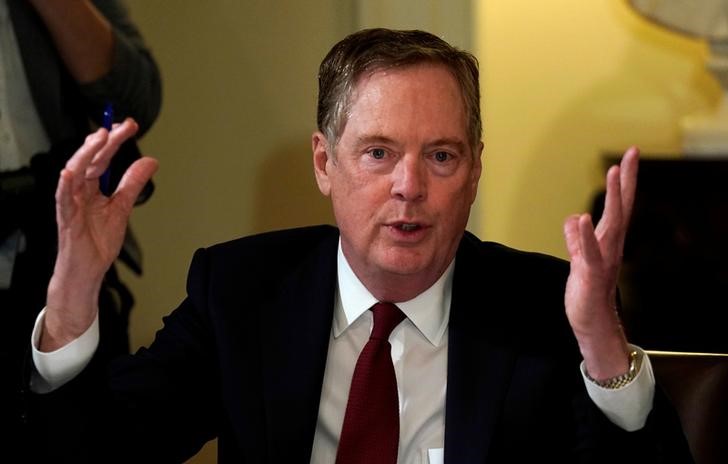 © Reuters. U.S. Trade Representative Robert Lighthizer speaks at the White House in Washington
© Reuters. U.S. Trade Representative Robert Lighthizer speaks at the White House in WashingtonBy David Lawder and Jonathan Spicer
WASHINGTON/NEW YORK (Reuters) – The top U.S. trade official on Thursday poured cold water on the prospect of an imminent breakthrough in talks to rework the North American Free Trade Agreement (NAFTA) hours after Canada’s prime minister struck a positive note.
“The NAFTA countries are nowhere near close to a deal,” U.S. Trade Representative Robert Lighthizer said in a statement, pointing to “gaping differences” on a host of issues, including intellectual property, agricultural access, labor and energy.
Lighthizer said he would continue to work toward “the best possible deal for American farmers, ranchers, workers, and businesses.”
The future of trade talks between the United States, Mexico and Canada was in limbo as a Thursday deadline passed to present U.S. lawmakers with a revamped NAFTA after a push to conclude a deal in the past few weeks.
There was no immediate reaction to Lighthizer’s comments from the offices of Canadian Prime Minister Justin Trudeau and Foreign Minister Chrystia Freeland.
U.S. officials say the negotiations need to wrap up very soon to give the current Congress time to vote on a final text.
Earlier on Thursday, Trudeau said he felt “positive” about talks to rework NAFTA, while a top Mexican official noted a deal might be possible by the end of May.
“To be honest, we are down to a point where there is a good deal on the table,” Trudeau told the Economic Club of New York. “It’s right down to the last conversations. … I’m feeling positive about this, but it won’t be done until it’s done.”
Freeland traveled to Washington on Thursday for internal meetings with labor officials and representatives from the U.S. Chamber of Commerce, a spokesman for her said.
A Mexican technical negotiating team is in Washington, but there is no date set for the next NAFTA ministerial meeting with the United States and Canada.
Mexico’s economy minister, Ildefonso Guajardo, said a deal could be reached by the end of May, but added that if no agreement is reached the talks could extend beyond the July 1 Mexican presidential election.
For that to happen, though, the United States and Mexico would have to end what officials say is deadlock over U.S. demands to raise wages in the auto sector and boost the North American content of cars made in the three NAFTA nations.
Critics complain the move is a clear swipe at Mexico, which U.S. President Donald Trump says added low-wage manufacturing jobs at Americans’ expense after NAFTA was signed in 1994.
“Any renegotiated NAFTA that implies losses of existing Mexican jobs is unacceptable,” Guajardo said in a tweet.
Under the Trade Promotion Authority statute that would allow a simple yes or no vote on NAFTA, Trump must notify Congress 90 days before he can sign the agreement. The U.S. International Trade Commission then has up to 105 days after the signing to produce a study on the effects of the agreement.
U.S. House of Representatives Speaker Paul Ryan has said that the Republican-controlled Congress would need to be notified of a new deal by Thursday to give lawmakers a chance to approve it before a newly elected Congress takes over in January.
Ryan, asked on Thursday whether there was any wiggle room in the NAFTA approval timeline for Congress, said, “The wiggle room would be at the ITC.”
“My guess,” he added, “is there is probably some wiggle room at the ITC for what it takes for their part of the process but not an indefinite amount and that means time is really of the essence.”
Source: Investing.com



























